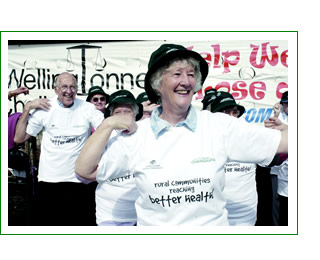The people of Wellington, a small town in mid western New South Wales, developed a creative way of tackling the problems of obesity, diabetes and heart disease in their community. They called it the ‘WellingTONNE Challenge’. Of the 9,200 residents of Wellington, around 2,400 were considered overweight, so the challenge was for local residents to collectively lose a tonne in weight.
To help people lose weight, the local health service organised healthy eating classes, cooking sessions, exercise classes, supermarket tours and regular weigh ins for the participants. The Australian Government’s Department of Health and Ageing provided funding for the initiative through the Rural Chronic Disease Initiative (2000–2004).
The WellingTONNE Challenge developed a lifestyle model around promoting a healthy diet and physical activity, focusing in the first instance on the overweight people in the community.
The Australian Institute of Health and Welfare (AIHW) estimates that there are 7.5 million adult Australians who are either overweight or obese. About 3.7 million Australians or 19.4 per centof the population report a current cardiovascular condition. Cardiovascular disease (CVD) kills more people than any other disease, accounting for 39 per cent of all deaths in 2000, and taking up the largest share of health expenditure (Australia’s Health 2004, AIHW).
The WellingTONNE Challenge began on 22 February 2003, with more than 450 people registering at the official weigh in and many other members of the community participating without officially registering.
The whole community supported the project throughout the period of the WellingTONNE Challenge. Local sport and recreation providers offered special deals to encourage people to take part in physical activities including gyms, golf and line dancing. Most local food businesses got into the spirit by offering less fatty and sugary alternatives at special prices. Hotels served up counter meals offering grills with salad instead of schnitzel and chips.
According to the scales, the program led to a net loss of 772 kilograms by May 2003. As this was short of the target set for the community, many people wanted the WellingTONNE Challenge to continue.
The town continued to support the challenge and by June 2004 participants had not only achieved the official target by losing a tonne but had changed their lifestyle enough to keep it off. Weight loss was only one benefit for the people of Wellington. The Wellington Health Service reports that people are now eating better and have become more physically active and feeling healthier and happier; there are better food choices available and there has been a great sense of community engendered by the project.
Debbie Bennett, a diabetes educator and member of the WellingTONNE Challenge Committee, said the project also broke down many social barriers.
Obesity is a major problem is Australia and other developed countries and people need to find ways to lose and maintain their weight to avoid serious health problems. The WellingTONNE Challenge is a great example of how a small community can help itself to better health. The WellingTONNE Challenge team produced a WellingTONNE Challenge tool kit, a step by step guide for other communities on how to establish their own version of the program. Around 2,500 kits have been distributed to date.
A free copy of the resource kit may be obtained by writing to: National Mail and Marketing, PO Box 7077, Canberra BC ACT 2610. Quote the title: The WellingTONNE Challenge.
For further information please contact Liz Cotton, Rural Primary Health, Department of Health and Ageing, on (02) 6289 7171.

















